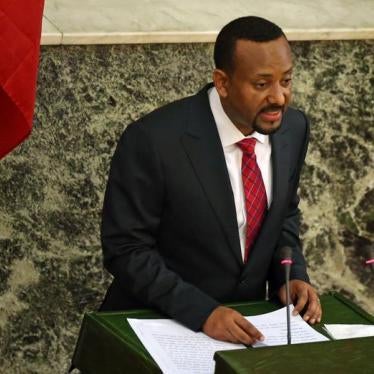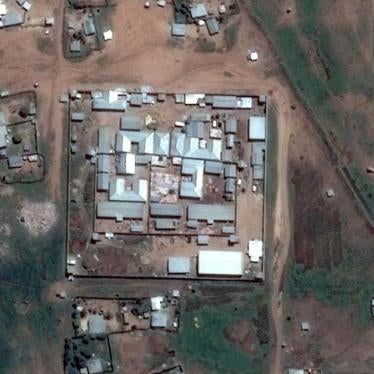Dear Honorable Commissioner Essaiem,
We are writing to you from Human Rights Watch to share with you the findings of our most recent report on Ethiopia, “We are Like the Dead’: Torture and other Human Rights Abuses in Jail Ogaden, Somali Regional State, Ethiopia.” The 88-page report, published in July 2018, documents the torture, cruel and inhumane treatment that prisoners have long endured in Jigjiga central prison, also known as “Jail Ogaden,” in Ethiopia’s Somali Regional State.
Based on around 100 interviews, including with security force members, government officials, and 70 former detainees, the report documents abuse in Jail Ogaden between 2011 and early 2018. Human Rights Watch also reviewed 25 hours of video in which “Jail Ogaden” prison guards described their own abusive practices.
Former prisoners described to Human Rights Watch a horrific reality of constant abuse including torture, rape and humiliation, with no access to adequate medical care, family, lawyers, or even, at times, food. Officials stripped naked and beat prisoners and forced them to perform humiliating acts in front of the entire prison population, as punishment and to instill shame and fear. Most prisoners are accused of some affiliation with the Ogaden National Liberation Front (ONLF), an opposition group that was until recently banned, and are coerced into confessing to membership in the group, even if most never face charges or trial. Due to a lack of health care, some prisoners died from their injuries while female prisoners gave birth inside their cells in horrible settings. Cells are often overcrowded.
The prison’s security forces, mainly the Somali Region’s notorious paramilitary force, the “Liyu Police,” are implicated in running the jail and directly ordering torture. Human Rights Watch has on several occasions documented serious abuses, including extrajudicial executions, by the “Liyu Police” since its establishment as a counterinsurgency force. Abdi Mohamoud Omar, known as Abdi Illey, the Somali Region president, commanded the Liyu police, though he resigned on August 6, 2018 and its current command structure remains unclear. The prison is managed by the Somali regional administration with no meaningful oversight from the Ethiopian federal government.
Ethiopia ratified the African Charter on Human and Peoples Rights (African Charter) in 1998 and is legally bound by Article 5, which clearly states that “every individual shall have the right to the respect of the dignity inherent in a human being and to the recognition of his legal status. All forms of exploitation and degradation of man particularly slavery, slave trade, torture, cruel, inhuman or degrading punishment and treatment shall be prohibited.”
The Resolution on Guidelines and Measures for the Prohibition and Prevention of Torture, Cruel, Inhuman or Degrading Treatment or Punishment in Africa (Robben Island Guidelines) of 2008 also affirms that states should cooperate with United Nations (UN) treaty bodies and mechanisms, criminalize torture, investigate complaints and combat impunity. Robben Island Guidelines also uphold that states have an obligation to improve detention conditions and design oversight mechanisms.
Ethiopia also acceded to the convention against Torture in 1994 and incorporated similar provisions in its constitution, but our research and interviews with many survivors over the years show that torture and impunity for torture are widespread across Ethiopia. Despite the Robben Island Guidelines clear provisions that states should “promote and support co-operation with international mechanisms” and “encourage and facilitate visits by NGOs to places of detention,” the Ethiopian government does not allow visit from any international mechanisms. Ethiopia ignored eight standing invitations from different UN mechanisms including from the Special Rapporteur on Torture and other Cruel Inhuman and Degrading Treatment or Punishment.
Additionally, organizations like the International Committee of the Red Cross have no access to federal prisons, police stations, or regional detention center like “Jail Ogaden.” There is therefore no comprehensive independent monitoring of institutions in which prisoners are known to have been tortured. No law enforcement body has been held accountable for human rights abuses.
Positively, on June 18, Ethiopia’s new prime minister acknowledged in a speech before parliament that security force personnel engage in torture. Furthermore, on July 24, 2018, the Federal Attorney General said that investigations on torture in detention centers would be conducted, and that his office would forward their recommendations. Given the findings of this report, as well as this new opportunity, we would like to encourage your mandate to:
- Seek an official invitation to Ethiopia to investigate issues around torture in general, and the case of “Jail Ogaden” in particular;
- Transmit a letter of appeal of urging the Ethiopian government to:
- Cooperate with international mechanisms and invite different UN mechanisms;
- Combat impunity by ensuring that those responsible for acts of torture or ill-treatment are subject to legal process;
- Establish judicial, quasi-judicial, administrative, traditional and other processes to enable victims to access and obtain redress;
- Continue to press the Ethiopian government to grant independent international humanitarian and human rights organizations access to detention facilities.
We look forward to receiving your response and maintaining a constructive dialogue with your mandate.
Yours sincerely,
Maria Burnett
Associate Director, Africa Division
Human Rights Watch
CC:
Honorable Commissioner Lawrence Muguru Mute
Vice Chairperson and Country Rapporteur, Ethiopia
Dr. Mary Maboreke
Secretary of the African Commission







